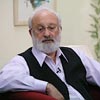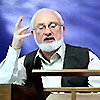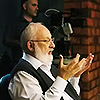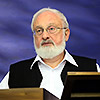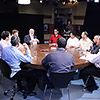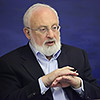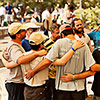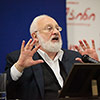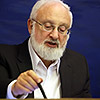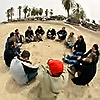 Question: When you speak about people who have received a spiritual “virus” and advanced in the corporeal world in some way, do you mean outstanding people?
Question: When you speak about people who have received a spiritual “virus” and advanced in the corporeal world in some way, do you mean outstanding people?
Answer: Yes, this is a consequence of Bina. Bina is expansion, bestowal, a quality opposite to Malchut. When two qualities join together, egoism and some small germs of altruism that have fallen from the spiritual level, egoism receives direction and greater strength because it contains a spark of the upper light.
Therefore, such egoism is more fortunate, more successful, and this is expressed in results.
Today the Kabbalistic method is open to everyone. Once, in Ancient Babylon, only a small part of humanity used it. By the way, throughout history many people, the so-called “Gerim” from different nations (converts), joined it.
If we look at ancient history from the exodus from Egypt through the existence of the Kingdom of Israel until the destruction of the Second Temple, this was a period when huge masses of different tribes came and joined the spiritual elevation. Among them there were many great Kabbalists.
Comment: But when they joined, they did not become Jews.
My Response: What does it mean that people “join”? It means they take this method and begin to realize it within themselves, just like in Ancient Babylon. Abraham, the ancient Babylonian priest, gathered a couple of thousand people around himself, created a group from them, and from this group a people was formed, so to speak.
What does “a people” mean? It is a group of individuals united by a single goal of spiritual ascent. Whoever wants it joins. On the level of our world, there is actually no such concept as “the Jewish people.”
Comment: But in Israel it is a nation.
My Response: No, it is not a nation. Even today it is not a nation, but a gathering. When will the Jews become a nation? When they begin to unite among themselves with the force of mutual love. Only this force can unite them into a nation. There is no other force that can bond them together.
In any other nation there is a natural force from below that bonds people together. But above this group, there must be a force from above.
Therefore, today, for example, an Italian can become a Jew.
“But you are Italian!”
“I am no longer Italian, I am a Jew.”
“How is that? What about your father and mother?”
“My father and mother are no longer ‘mine’.”
I am Jewish, and I cannot become an Italian because I was not born to Italian parents. But an Italian can become a Jew of full value if he takes upon himself the method of spiritual ascent. The laws of conversion to Judaism are based only on this. And he can no longer go back and become Italian again.
This is a very irrational model but it exists in our world, although no one really understands it because it is built on spiritual laws that we are trying to squeeze into our world like into a Procrustean bed. But it does not work.
People do not understand this. It all sounds very strange. But gradually we are approaching a time when clarification will begin to take place in humanity regarding the entire historical picture: why it happened this way, what it brings, and why it must be this way.
But for now, people only have questions, and there are no answers.
[351572]
From KabTV’s “I Got a Call. Children of Israel, Part 2” 10/1/10
Related Material:
When Can The Israelites Be Called A Nation?
Jew—The Goal Of Correcting Yourself
A Wisdom That Is Open For Everyone



